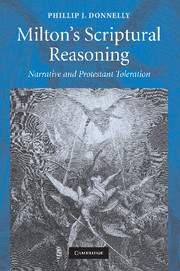Book contents
- Frontmatter
- Contents
- Preface and acknowledgments
- Abbreviations and editions
- 1 Introduction: Scriptural reasoning
- PART I SCRIPTURAL REASONING IN MILTON'S PROSE
- PART II BIBLICIST RHETORIC AND ONTOLOGY IN PARADISE LOST
- Part II introduction
- 4 Divine justice and divine filiation
- 5 Divine kingship
- 6 Rational battle
- 7 Rational allegory and gender
- PART III BIBLICIST POETICS AND HERMENEUTIC ETHICS
- Notes
- Subject index
- Index of Scripture references
4 - Divine justice and divine filiation
Published online by Cambridge University Press: 04 September 2009
- Frontmatter
- Contents
- Preface and acknowledgments
- Abbreviations and editions
- 1 Introduction: Scriptural reasoning
- PART I SCRIPTURAL REASONING IN MILTON'S PROSE
- PART II BIBLICIST RHETORIC AND ONTOLOGY IN PARADISE LOST
- Part II introduction
- 4 Divine justice and divine filiation
- 5 Divine kingship
- 6 Rational battle
- 7 Rational allegory and gender
- PART III BIBLICIST POETICS AND HERMENEUTIC ETHICS
- Notes
- Subject index
- Index of Scripture references
Summary
To pose the question, as Paradise Lost does, whether the “ways of God to men” are just requires some presumed meaning to the term “ways.” As a result, any consideration of the question, whether tending to a positive or a negative answer, must deploy some working assumptions regarding the character of the causal relationship between the posited “God” and creation. Milton's experience with Calvinist Presbyterianism showed him that if that relation is reduced to absolute necessity, without recourse to any sense of what is aesthetically fitting, then divine action in and toward creation must appear as tyrannic coercion. I contend that Milton appreciated this difficulty, and, as result, Paradise Lost implicitly addresses the theological problems that arise from reducing divine causation of the cosmos to absolute necessity. As Chapters 1 and 3 have shown, understanding Miltonic reason as the poetic gift of peaceful difference transforms our perception of his ontology, his account of what is real. For Milton, neither divine nor human reason is mere instrumental coercion because reality, or being, is not chaos but subsists as divine gift, or charity. Such a view contrasts with the ancient and modern tendency to understand “reality” either as fundamentally chaotic, or as statically determinate, or as the strife between two such principles. Against the ways that these ontological alternatives had influenced early-modern Christian theology, Milton's poetry deploys biblical idiom in order to preserve a central place for beauty, or glory, in Christian ontology.
- Type
- Chapter
- Information
- Milton's Scriptural ReasoningNarrative and Protestant Toleration, pp. 77 - 103Publisher: Cambridge University PressPrint publication year: 2009

